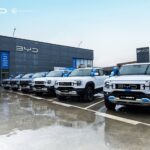The Future of Logistics at BMW Group Plant Regensburg
BMW Group Plant Regensburg is at the forefront of digitalisation and automation in the automotive industry. As part of the BMW iFACTORY initiative, the plant is embracing digital, automated, and cloud-connected logistics to streamline production processes and enhance efficiency. With a vehicle rolling off the assembly line every 57 seconds, the plant is a hub of activity, producing a diverse range of vehicles tailored to individual customer preferences.
The logistics involved in manufacturing these vehicles are intricate and crucial to the smooth operation of the assembly line. Components and parts must be delivered to the right place at the right time, following a “just in time” and “just in sequence” approach. This is where BMW Automated Transport Services (ATS) comes into play, managing a fleet of driverless, automated, and autonomous transport systems that are interconnected through a cloud-based traffic control system.
Various types of driverless vehicles are utilized for different transport tasks at the plant. Automated tugger trains and Smart Transport Robots (STR) handle the transportation of small and large components, respectively. These autonomous vehicles operate using AI modules and sensors, allowing them to navigate around obstacles and follow designated routes independently.
The heart of the logistics operation is the BMW ATS control system, which orchestrates the movement of nearly 50 automated tugger trains and over 140 Smart Transport Robots. This system ensures timely delivery of materials, optimal route guidance, and efficient traffic flow within the assembly hall. It plays a crucial role in maintaining the seamless operation of the production line by preventing any disruptions in the supply of sequenced parts.
Continuous expansion and integration of new autonomous transport systems are part of the plant’s vision for the future. Plans are underway to incorporate autonomous lifting trucks and automated forklifts into the existing fleet, further enhancing the efficiency of the logistics operations. The goal is to create a fully interconnected network of autonomous transport systems that work together seamlessly to support the production process.
In addition to the existing fleet, a new autonomous transport vehicle with a payload capacity of 55 tonnes has been introduced in the Regensburg press shop. This vehicle represents the plant’s commitment to innovation and advancement in the field of logistics, paving the way for a more efficient and streamlined production process.






